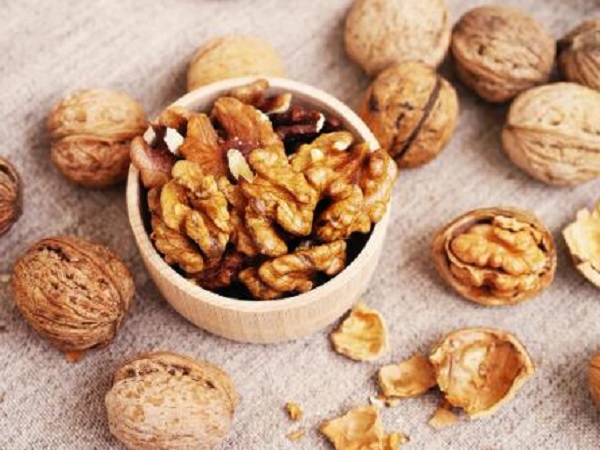Discovering whether can dogs eat walnuts is crucial for responsible pet ownership. While walnuts may be a nutritious snack for humans, they are not recommended for dogs. In this article, we’ll delve into the reasons why walnuts are not suitable for canine consumption, exploring potential risks ranging from digestive issues to toxicity. Understanding these factors is essential to ensure the well-being of your furry friend. Join us as we explore everything you need to know about the compatibility of walnuts with your dog’s diet.

Can Dogs Eat Walnuts?
It is typically not advised to feed walnuts to dogs. Walnuts provide possible dangers and are best avoided completely, in contrast to almonds and cashews, which may be sometimes fed to dogs in tiny quantities. A walnut or two accidentally downed may not cause immediate damage, but it’s important to understand that because of their makeup, walnuts may be harmful to dogs. It’s best not to include walnuts in your pet’s food if you want to protect their health.
Is it okay for dogs to eat walnuts?

It is typically advised against giving dogs walnuts to eat. They won’t necessarily be hurt if they unintentionally eat a walnut that falls off a kitchen counter, but it’s still important to use caution. Dogs may become ill from walnuts, particularly if they eat them in big amounts. It is advised to refrain from purposefully giving dogs walnuts due to the hazards involved with their composition. It’s more prudent to choose other, dog-friendly treats if you’re concerned about your dog’s safety and wellbeing.
Black Walnuts
One particular kind of walnut that is well recognized to be very harmful to dogs is the black walnut. Native to the Northeastern United States and Canada, these nuts are dangerous for horses and dogs alike, but they don’t seem to bother cats. It is crucial to note that English walnuts, not black walnuts, are usually the kind of walnuts that are commercially offered in shops. However, knowledge of certain walnut varieties’ potential toxicity highlights the need of exercising care and the significance of keeping dogs away from them.
Toxic Mold
Walnuts, particularly those collected outdoors, can harbor a toxic black mold dangerous to dogs. Even high-quality store-bought walnuts, with their high moisture content, may develop fungi at any stage, whether shelled or not. Some of these fungi produce harmful mycotoxins, including carcinogenic ones and tremorgenic mycotoxins that can cause tremors and seizures in dogs. While boiling and drying walnuts can remove potential mold, the effort may not be worth it, considering the variety of safe treats readily available for dogs.
Health problems of dogs when eating walnuts
Dogs who eat walnuts may have a number of health issues, so it’s important for pet owners to be aware of these concerns. When a dog eats black walnuts or rotten walnuts, they might become sick and throw up, shake, or have seizures. Small dogs, pups, and elderly dogs may be more vulnerable to this illness, which calls for prompt veterinarian care in order to avoid death.
While ordinary, mold-free walnuts from the supermarket may not be poisonous in modest amounts, consuming too many of them might have negative health effects:
- Fat Content: Due to their high fat content, walnuts may upset a dog’s stomach, causing typical symptoms including vomiting and diarrhea. In extreme situations, this may develop into illnesses like gastroenteritis, or inflammation of the gastrointestinal system, or pancreatitis, or inflammation of the pancreas.
- Salt & spices: Walnuts in packaging may have spices or salt additions that are toxic to dogs. Large doses of these substances have the potential to cause illness in dogs and worsen existing conditions.
- Gastrointestinal blockage: Particularly in smaller dog breeds, the comparatively bigger size of walnuts presents a danger of gastrointestinal blockage. If left untreated, this ailment may be deadly and need surgical intervention.
- Choking Hazard: The round shape of walnuts increases the risk of choking, particularly in dogs that tend to swallow food without proper chewing.
It’s critical to keep dogs away from walnuts, especially ones that have mold or other chemicals, for their own health. Selecting healthier, canine-friendly snacks instead of walnuts helps shield against any possible health problems. If signs or problems develop after a dog eats walnuts, regular observation and immediate veterinarian intervention are essential.
What kinds of seeds, in order to be safe, should you give your dog?
For safe and nutritious seed options for your dog, consider pumpkin seeds (unsalted and preferably roasted), sunflower seeds (unsalted and shelled), chia seeds (soaked or added to moist food), ground flaxseeds (ensure they are ground for better digestibility), and hemp seeds (in moderation, sprinkled on food). Always consult your veterinarian before introducing new foods, and be mindful of moderation to prevent digestive issues and excessive calorie intake. Avoid seeds with added flavorings or salt for the overall well-being of your dog.
Conclusion
It is advisable to refrain from feeding walnuts to dogs due to the potential risks associated with their consumption. Whether it’s the dangers of mold contamination, high-fat content, the presence of additives, or the risk of gastrointestinal issues, there are multiple reasons to err on the side of caution. Instead, consider offering safer alternatives such as vet-approved treats and seeds. Prioritizing your dog’s well-being means making informed choices and avoiding potential health hazards, ensuring a happy and healthy life for your furry companion.
